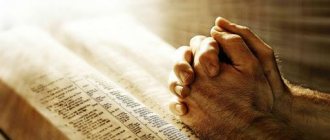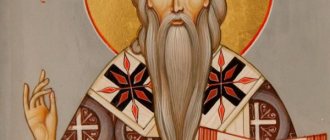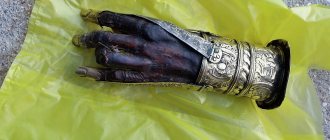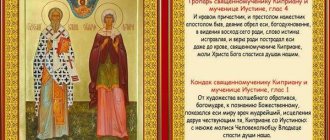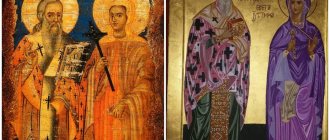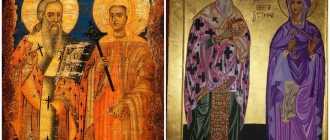What to do when a tooth hurts?
Sometimes situations arise when, with a toothache, it is not possible to immediately seek medical help. A tooth may hurt at night, on weekends when there is no doctor’s appointment, or while traveling. In this case, believers resort to God's help. And prayer for toothache helps them.
However, prayer should not be confused with conspiracy. In Orthodoxy there is no such thing as a “special strong prayer for toothache.” Prayer does not “speak” pain. For Christians, prayer is a way of spiritual communication with God, the Blessed Virgin Mary, and the saints. What is asked in prayers is fulfilled by the Merciful Lord himself.
Dentistry
Christians “often pray not only out of pure love for God, but also in anticipation of the good that they hope to receive from Him. But this prayer is pleasing to God and is very useful to man, elevating his spirit to God. By praying such a prayer, a person feels his dependence on God and strengthens his hope in Him. By this one learns to ask for help from Almighty God, from man, or from one’s own mind and strength. The Lord commanded that we turn to Him not only with praise or gratitude, but also with a request for our needs” (St. John of Shanghai, 1896-1966).
A truly powerful prayer is one that comes from a pure heart and strong faith. As Saint John Chrysostom said (347-407):
“The power of prayer extinguished the power of fire, curbed the rage of lions, stopped wars, stopped battles, calmed storms, drove away demons, opened the gates of heaven, dissolved the bonds of death, drove away diseases, repelled anger, strengthened wavering cities and blows sent from above, and human intrigues, and All disasters were warded off by prayer. I’m not talking about the prayer that happens only on the lips, but about the one that rises from the depths of the soul.”
Prayers to Panteleimon the Healer
The holy great martyr and healer Panteleimon lived in the second and third centuries. Since childhood, he grew up at the imperial court, studied medicine and was a court physician. He was distinguished by his external beauty and extraordinary generosity of spirit - he treated everyone who approached him for free. He converted to Christianity when he was about 20 years old, and since then he has healed primarily through prayer, asking the Lord for help. When Emperor Maximian found out about this, he demanded that the young man renounce his faith and make a pagan sacrifice, but Panteleimon refused. They tried to burn him, pierce him with spears, devour him with wild beasts and behead him with swords, but he remained unharmed. So they beheaded the young Christian. By his martyrdom, he showed many how strong the Lord is and how He protects His believers. Since then, Panteleimon has helped many people with their illnesses. The most powerful prayer for toothache in adults is the prayer of the healer Panteleimon. This saint can help endure suffering and alleviate it.
Holy great martyr and healer Panteleimon, blessed saint of God! Look with kindness and hear us, sinners, before Your holy icon when we pray our last prayer. Ask the Lord God, standing before Him with the angels in heaven, to forgive us our sins and misdeeds. Heal the mental and physical illnesses of the servants of God standing here, now mentioned, and all Orthodox Christians who trust in your intercession. For due to our sins we suffer grievously from many ailments and cannot find either help or consolation, but we turn to You, so that You give us the grace to pray for us and heal every ailment and every disease. May your holy prayers grant us all health and well-being for our souls and bodies, prosperity for our faith and piety, and everything that is necessary for earthly life and salvation. Having received through you great and rich mercies, let us glorify you and the Giver of all good things, the God of our saints, the Father and the Son and the Holy Spirit, mighty in the saints. Amen.
Prayers for dental diseases: who to contact
For intercession (mediation) before God, believers turn to the Mother of God and the saints. To whom exactly the prayer should be directed for toothache, everyone chooses independently.
“If there is a special reverence for some saint, it means that the saint spoke in one way or another into the person’s heart. Each person can have a special love for some saint, and when something happens to him, he receives help through the prayers of the saint. This may be a serious case, or it may not... Saints can sometimes immediately give what we ask of them, and sometimes they cannot. Sometimes a person’s prayers are heard because the person is in a good spiritual state, and sometimes because he cries and begs like a little child” (Elder Paisius the Svyatogorets).
Prayers to Matrona of Moscow
Matrona lived at the turn of the 19th and 20th centuries. She died after the end of the Great Patriotic War, so all the miracles that she performed were described by her contemporaries, and their authenticity is beyond doubt. Matrona was blind from birth and could barely walk as an adult. However, she smoothly moved in space, describing those people who stood in front of her. And, of course, she helped heal everyone who sincerely believed in God. It was especially useful for women and children. When the child was sick, she tried her best to help him. If you sincerely and with faith pray to Mother Moscow, she will help with a child’s toothache.
O blessed Mother Matrona, hear and accept us, sinners, praying to you, having learned throughout your life to accept and listen to all those who suffer and mourn, who with faith and hope resort to your intercession and help, offering everyone quick help and miraculous healing; So that even now Your mercy does not weaken towards us, unworthy, suffering in this eternal world and finding neither consolation, nor compassion in our sorrows, nor help in our bodily ailments: Heal our illnesses, deliver us from the temptations and torments of the devil, who is at war in your passion, help us carry our cross in this world, bear all the hardships of life and not lose the image of God in it, preserve the Orthodox faith until the end of our days, have faith and hope in God and undying love for our neighbors; Help us, when we depart from this life, to achieve the Kingdom of Heaven with all those who please God and glorify the mercy and goodness of our Heavenly Father, in the Holy Trinity, Father, Son and Holy Spirit, forever and ever. Amen.
Antipas of Pergamum - a saint who helps with toothache
According to the ancient Russian tradition, with toothache, believers turn to St. Antipas of Pergamon for help (1st century). He was a disciple of the Apostle John the Theologian. Saint Demetrius of Rostov (1651-1709) in the collection “Cheti-Minea” mentions Antipas among the seventy apostles. In the Church of Pergamon (western territory of modern Turkey), Antipas was installed as a bishop.
His life tells that during the reign of the cruel emperor Nero (54-68), Antipas preached faith in Jesus Christ. The saint refused to make sacrifices to the pagan gods. At that time, one of the execution instruments was a hollow sculpture of a copper bull, used as an oven. A prisoner was placed in it, and a fire was lit under the bull's belly. Bishop Antipas of Pergamon was given such a terrible death. With prayer on his lips, the saint gave up his soul to God. His body was secretly buried by Christians.
In the 5th century a temple was built above this place. The relics of the saint exuded myrrh (a fragrant oily substance). Many believers received help through their prayers to the saint. Antipas of Pergamon became especially famous for his help with toothache. In the complete Orthodox prayer book you can find a prayer to the saint. It contains a request for healing from toothache.
In the Orthodox Church, the memorial day of St. Antipas of Pergamon is established - April 24, according to the new style.
Text of the book “Healer Panteleimon and fifteen holy doctors will help you”
The memory of the Apostle and Evangelist Luke is celebrated by the Church on October 31
We praise the apostolic acts of the narrator and the Gospel of Christ as a luminous writer, Luke, the glorious being of the Church of Christ, with the sacred hymns of the holy apostle we praise, as a physician, human infirmities, natural illnesses and illnesses of souls, healing and praying unceasingly for our souls.
Hieromartyr Antipas of Pergamon
…
Hearing that I wanted to know something about the cases of help from Saint Antipas, my friend perked up pleasantly.
– Oh, I’m so grateful to him, I’ll tell you now. Here is how it was. I did my teeth. The event is unpleasant for anyone, but for me it’s just like death. I'm not kidding. Indeed, that time, as always, I was afraid of dying at the hands of the dentist. Therefore, she suffered incredibly and told everyone about the coming horror - she had to pull out 11 teeth in one fell swoop! And they brought me an akathist to Antipas of Pergamon. I didn’t know anything about him; after reading the akathist, I only understood that he endured great torment while they were boiling him in oil. And I was ashamed. What did the person endure - and I? They just pull my teeth, and then under anesthesia. Well, I prayed to him, asking for forgiveness for my fear.
The end result was that almost painlessly and bloodlessly, all my unusable teeth were pulled out in two attempts. And everything healed instantly!
Finally, filled with gratitude, she decided to thank Saint Antipas. But who knows where to look for his icon? I just went to light a candle - to the Prince Vladimir Cathedral, it was on the way. The first thing I saw was the icon of St. Antipas of Pergamon, peacefully hanging on the wall. I recognized him immediately - just like the image in that akathist.
…
After listening to the story, I also remembered... From my own experience...
It was a few years ago, I had to undergo a very unpleasant operation on an outpatient basis - to lift my gums and grind down all the bones sticking out in different directions, the sockets from many pulled out teeth. The doctor explained life-affirmingly that “it’s no big deal, they’ll just cut off the extra bone.” Nah...
While getting ready for the operation, I felt a chilling horror, and my hand automatically reached out for the prayer book. Desperately peering at the content, I saw: “Prayers for healing from toothache.” She opened it and saw the first one, the Hieromartyr Antipas, Bishop of Pergamon. Antipas had no idea where Pergamon was or who its bishop was. But she grabbed the volume and put it in her bag. Sitting in front of my office, I read this prayer over and over again. And when she lay down on the operating table, she simply repeated all the time: “Saint Antipas, help!”
Everything went with a bang.
I was told in advance that everything would take at least ten days to heal. And most likely painful.
It healed in three days. Without pain.
The Hieromartyr Antipas, a disciple of the holy Apostle John the Theologian, was the bishop of the Pergamon Church during the reign of the terrible Emperor Nero (54–68), who demanded constant sacrifice to pagan idols, and execution or exile awaited those who disobeyed. By his example, firm faith and tireless preaching about Christ, the saint achieved that the inhabitants of Pergamum began to shirk sacrifices to idols. The pagan priests reproached the bishop for turning the people away from worshiping their native gods, and demanded that he stop preaching about Christ and sacrifice to idols.
Saint Antipas calmly replied that he would not serve the demon gods.
At that time, by order of the emperor, everyone who did not sacrifice to idols was executed or expelled. Then the holy Apostle John the Theologian was imprisoned on the island of Patmos (in the Aegean Sea), to whom the Lord revealed the future destinies of the world and the Holy Church.
The enraged priests dragged the holy martyr Antipas to the temple of Artemis and threw him into a red-hot copper ox, where sacrifices to idols were usually thrown. The holy martyr loudly prayed to God in a red-hot furnace, asking him to accept his soul and strengthen the faith of Christians. The fire did not touch the body of the martyr - according to legend, the saint, who prayed incessantly, seemed to have fallen asleep. This happened around '69.
At night, Christians took the body of the holy martyr Antipas and buried him with honor in Pergamum.
The tomb of the holy martyr became a source of miracles and healings from various diseases. They especially resort to the holy martyr Antipas for toothaches.
John the Theologian wrote about him in the Apocalypse: “And write to the Angel of the Church of Pergamon: Thus says He who has a sharp sword on both sides: I know your works, and that you live where the throne of Satan is, and that you keep My Name, and have not renounced My faith. even in those days in which among you, where Satan dwells, My faithful witness Antipas was killed” (Rev. 2:12-13).
In Rus', Saint Antipas has been known since ancient times. In Moscow there is the Antipievsky Church, from whose website I took the following lines[18]:
“It is unknown why in old Moscow and in this very place the church was consecrated in the name of St. Antipas, Bishop of Pergamon, disciple of the holy Apostle John the Theologian.
The reason for the dedication of the church on Volkhonka has remained a secret of history. Another mystery was the time of its construction. Unconditionally, it dates back to the 1530s, but there is a version that the first wooden church on this site was built by Aleviz Fryazin himself in 1514 or 1519. It is sometimes believed that he built another temple here, in the name of St. Metropolitan Peter, and in its place a new Antipievskaya Church was later built (or rebuilt). The third mystery was the name of the temple builders. United
Scholars publicly admit that the Skuratov family, whose estate was closely adjacent to it on the eastern side, took part in the construction of the temple, and sometimes timidly mention the name of the main, famous representative of this family - Grigory Lukyanovich Belsky, better known as Malyuta Skuratov.”
…
Shrine of the Rovenets land
In the post-Napoleonic era, that is, at the distant beginning of the 19th century, quiet and calm times came in the Russian Empire. No, there were wars, but far away. On the periphery. And a regular army fought there with professional troops and officers who came from the circles of the highest and middle nobility. In the center of Russia, in Little Russia, Belarus and beyond the Urals, cities, villages, hamlets and villages were filled with Orthodox people, cultivating the land and working in crafts. Most of all, of course, they fed on Mother Earth. They were peasants.
And then the landowners, especially in the black earth provinces, had one, but fiery whim. Every year, according to their serfdom, they sent their “tortured by grave captivity” peasants to the holy land, to Palestine. One person from each family. One by one. How the parish priest blessed it, and the estate manager allowed it, or the master appointed it.
The pilgrims were gathered by the whole community. There were a great many orders about prayers, bows and liturgies with prayer services in the Holy Land, at the Holy Sepulcher. They said goodbye not without tears. The road is long, and often not everyone could overcome it. On the path we traveled, we often came across bumps with crosses. Some, not having reached it, gave their souls to God, heading to His shrines, while others did not reach home. They introduced themselves, praying for themselves and for their entire family. Six months one way, the same amount of travel to the homeland, and six months visiting Palestinian shrines, churches and monasteries is a lot of time.
One of these pilgrimage groups, somewhere in the middle of the century before last, decided to turn off the established pilgrimage route in order to shorten the path to their native homes and huts. These were peasants from the Bogucharovsky district of the Voronezh province, that is, the northern neighbors of our blessed lands, which at that time were part of the territory of the Great Don Army.
They were walking in the summer, in a hurry to get to the harvest, so they decided to “cut off” part of the path, not to go, as was customary, to the relics of St. Joasaph of Belgorod, but to go straight, through Millerovo, to Boguchar, and there it was already within easy reach of their native villages.
In the evening we stopped at the beginning of a gully heavily overgrown with forest and bushes. They heard the sound of water and realized that the Lord himself had led them to an overnight stay. When we went down a little, we saw a small waterfall from a full water spring gushing out from under the stones. The water formed a small lake and ran into the dark depths, covered with algae, mud and small reeds.
We settled down on a slope, having previously surrounded the overnight site with a thick fur rope, a barrier from snakes, which always settled on the border between the dry feather grass steppe and water. Having washed ourselves off the road dust, we ate hot soup and, thanking God for our daily bread and a comfortable place to stay for the night, settled down for the night. The pilgrims were tired. The path is not easy.
In the morning, at dawn, as expected, the headman was the first to rise. Surprised by the lightness of the body and the complete disappearance of the fatigue that had accumulated for such a long time from not such a long sleep, he decided to wait a little longer, not to wake up the prayer walkers, and carefully, without making any noise, went down to the spring to wash. The rising sun played in the falling water with colorful flashes. The elder admired the beauty, crossed his forehead with the words “Thou hast created all wisdom...” and immediately froze in amazement. A man in bishop's vestments looked at him from the cascading streams of a life-giving spring. The headman wanted to shout, to call someone, but he could only quietly repeat, crossing himself often and smallly:
- Lord, what is this??? Lord, how is this???
But they heard him. Several more pilgrims-peasants came down and stared at the waterfall in awe. A bishop stood in the falling water.
How long this vision lasted is unknown, only the sun began to shine stronger, the water splashes lost their rainbows, and the wonderful vision dissolved in the water.
It must be said that in those days the people were not only God-fearing, but also knowledgeable of God’s Law. My favorite stories on long winter evenings were the lives of saints. Our ancestors knew not only the list of exploits of martyrs and saints, but also what they looked like. Everyone went to church, and there were images on the walls and lecterns.
When they had recovered a little from the raptures, screams and lamentations, they sang a prayer of thanks, and immediately began to judge and judge who it was they saw in the spring, who gave them a sign and why he appeared at dawn?
This is where an incomprehensible absurdity arose - no one could say what kind of saint it was who was looking at them from the well. None of the pilgrims saw this image. While we were thinking and arguing, the time came to continue our journey, and then other oddities emerged. The pilgrims looked in amazement at their clean feet, free of scratches, abrasions and sore calluses. After all, last night my feet were twisting and sore from the long journey, my body was aching, covered with non-healing wounds and skin that had been removed... And now the sores are gone.
Those who were bothered by teeth were especially happy. Where can you pull it out without a farrier? Now the pilgrims were smiling, miraculously freed from debilitating pain. No teeth hurt!
The rest of the way, and they walked for more than two weeks, the only talk was about the miracle at the spring. Everyone carried water from the source home in a knapsack and the shore was stronger than the Palestinian shrines. They arrived at the district Boguchar in the evening. We spent the night in the church yard, under a canopy. Although it was no longer a dream, we took a little rest, our relatives were already at home, a day or two away. And many came from the locals, to listen to stories about distant shrines, to find out what was happening across the seas, and how foreign and other religious people lived. When our pilgrims told about a wonderful phenomenon that had recently happened to them, many were overcome by doubts, as is the case in our area, but in such a sinful time do miracles happen?
But those words about the amazing source were deposited in the memory of the peasants, and the next morning, when pilgrims entered the temple of God on the way to the temple of God, the recent miracle was confirmed. In the vestibule of the temple, on the left side, the same bishop was looking at them from the wall. In the halo above him in Church Slavonic script, the pilgrims who fell to their knees read: “Holy Hieromartyr Antipas, Bishop of Pergamon.”
This is where our holy Antipiev Spring originates.
What happened next? What follows is a rich story with joys and troubles, with prayers and rejection, but just as then, 150 years ago, the holy water of the Orthodox faith breaks through from the land of Rovenets.
Information about the origin of the source was found by the author in the archives of the All-Great Don Army in Taganrog.[19]
Prayer to the Hieromartyr Antipas, Bishop of Pergamum in Asia
Oh, glorious Hieromartyr Antipos and quick helper to Christians in illness! I believe with all my soul and thoughts that the Lord has given you the gift of healing the sick, healing the sick, and strengthening the weak. For this reason, I come to you, as a blessed doctor of diseases, I am weak and, kissing your venerable image with reverence, I pray: through your intercession from the Heavenly King, ask me, who is sick, for healing from the dental disease that depresses me, even though I am unworthy of you, most gracious father and companion my intercessor, but you, being an imitator of God’s love for mankind, make me worthy of your intercession through my conversion from evil deeds to a good life, heal the ulcers and scabs of my soul and body with the grace abundantly given to you, grant me health and salvation and good haste in everything, Yes, having lived such a quiet and silent life in all piety and purity, I will be worthy to glorify the All-Holy Name of the Father and the Son and the Holy Spirit with all the saints. Amen.
Troparion to Antipas, Bishop of Pergamum in Asia
You abolished idolatrous flattery, Antipos, and trampled down the power of the devil, before the God-fighters you boldly confessed Christ: you also established yourself with the angelic ranks on high, bringing praise to the Lady of all, and offering prayerful thanksgiving for us, bestowing the grace of healing. For this reason we honor you, Hieromartyr Antipos: pray to Christ God to save our souls.
Martyr Tryphon
On February 14, when the world unanimously celebrates Valentine's Day, the Orthodox Church celebrates the memory of the martyr Tryphon, a holy healer and helper in organizing everyday affairs.
Tryphon the martyr has long become one of our own, dear to the Russian Orthodox people. Although he was born in Phrygia, at the beginning of the 3rd century. Phrygia is present-day Türkiye, a territory located approximately between Antalya and Istanbul.
Saint Tryphon is very dear to Russians, and especially to Muscovites. Why? This remains completely unclear from his life.
Not being familiar with the art of medicine, Tryphon from a young age received the gift of working miracles, healing human infirmities with the grace of God alone, and, as his life tells, he performed many healings.
The Roman Empire, which at that time included Phrygia, was ruled by the Emperor Gordian, who, although an idolater, was tolerant of Christians. The emperor's daughter was distinguished by her intelligence and beauty, and many sought her hand in marriage. But misfortune befell her: the devil entered her and began to cruelly torment her, throwing her into fire and water. The most famous and wise doctors were not able to heal her. But, by the command of God, the unclean spirit that dwelt in her himself said: “No one can drive me out of here except the youth Tryphon.”
Many Tryphons were brought to the emperor. But they were all powerless to drive the demon out of the girl. Finally, seventeen-year-old Tryphon was found, peacefully grazing geese at that time. He was taken to Rome. He had not yet reached the city when the devil shouted: “I can’t live here anymore, because Tryphon is approaching” - and left the girl. Her healing was immediate and complete.
When Tryphon came to Rome, the emperor, wanting to make sure that it was he who healed Gordiana and that, therefore, he had power over the world of fallen spirits, asked the youth to show him the devil so that he could be seen with his bodily eyes. At the prayer of Tryphon, the devil appeared before the king in the form of a black dog with fiery eyes and, when asked by the saint why he possessed the maiden, he said: “Over people who do not believe in God and the Son of God and, being obedient to their lusts, do what pleases us.” affairs, we receive full power to torment them. The following things are pleasing to us: idolatry, blasphemy, adultery, sorcery, envy, murder, pride; By these and similar deeds, people become entangled, as if in nets, alienated from God, Their Creator, and arbitrarily become our friends and accept eternal torment with us.”
The king generously rewarded Tryphon and released him in peace. But the holy youth was not interested in wealth; he distributed what he received to the poor and, returning home, indulged in his previous deeds - tending geese and healing the sick.
During the reign of Emperor Decius, a fierce persecutor of Christians, Saint Tryphon, for refusing to worship idols, was subjected to severe torture and, having steadfastly endured suffering, was beheaded with a sword, crowned with an incorruptible martyr's crown from God. This happened more than fifty years before the death of Saint Panteleimon, in the year 250.
We also know about the deliverance through the prayers of the Three backgrounds of the inhabitants of his village - Kampsada - from locusts. He loved his homeland very much and not only during his lifetime did not exchange Campsada for the brilliant Rome, but even after his death he indicated in a dream vision that his relics should be transferred from Nicaea, the place of his martyrdom, to his native village. Subsequently, the relics of Saint Tryphon were transferred to Constantinople, and then to Rome. Now they rest in Greece in one of the monasteries near Athens. The Holy Vvedensky Monastery in Kyiv houses part of the Christian shrine. And, like any other holy relics, particles of the relics of the holy martyr were distributed in large numbers to the churches of cities and towns in our country and throughout the Christian world.
They especially pray to the Martyr Tryphon for healing from bodily ailments, in any painful condition, during times of famine.
So what connects Saint Tryphon with Russia? Perhaps the famous miracle with Ivan the Terrible’s falconer, boyar Trifon Patrikeev, who once lost his favorite royal falcon during a hunt. This probably took place in Sokolniki, where falconry was usually held. Tryphon searched for the falcon for three days, and for losing it he was threatened with severe execution. On the third day, stopping at the Lazarev tract in the village of Naprudny, he began to earnestly pray to his heavenly patron, the martyr Tryphon. The saint appeared to his namesake in a dream in the form of a young man on a white horse with a falcon in his hands. Waking up, Tryphon saw that the falcon was sitting on his hand. In memory of the miraculous deliverance from the royal wrath, the falconer built a stone church in honor of Tryphon the Martyr, which to this day stands near the Rizhskaya metro station, on Trifonovskaya Street. And the names of the lane - Lazarevsky and the nearby cemetery - Lazarevskoye remind us of the Lazarevsky tract.
Since then, in Russia it has been customary to depict Tryphon the martyr on icons with a falcon in his hand. And his veneration became widespread in the country. There was even an opinion expressed that initially it was Tryphon the Martyr who was depicted on the coat of arms of Moscow - on a horse with a falcon in his hand - and it was as if later the image of the horseman began to be associated with St. George the Victorious.
Appeal to the holy martyr Tryphon never remains in vain. No wonder. After all, his last words before his death were: “Lord... receive my soul in peace, and all who will remember me, Thy servant, and in my memory will bring Holy Sacrifice to Thee, hear from the height of Thy shrine... giving them abundant and incorruptible gifts, for You are the only Good and Generous Giver forever and ever.”
Prayer to the Holy Martyr Tryphon
Oh, holy martyr of Christ Tryphon, quick helper to all who come running to you and pray before your holy image, quick to obey the intercessor! Hear now and forever the prayer of us, your unworthy servants, who honor your holy memory. You, servant of Christ, promised that before your departure from this corruptible life, you would pray for us to the Lord and asked Him for this gift: if anyone in any need and sorrow begins to call upon your holy name, may he be delivered from every excuse is evil. And just as you sometimes healed the daughter of the Tsar in the city of Rome from the torment of the devil, you saved us from his fierce machinations all the days of our lives, especially on the terrible day of our last breath, intercede for us, when the dark visions of evil demons surround and frighten us will begin. Then be our helper and quick drive away of evil demons, and leader to the Kingdom of Heaven, where you now stand with the face of the saints at the Throne of God, pray to the Lord, that he will grant us also to be partakers of ever-present joy and joy, so that together with you we will be worthy of glorifying the Father and the Son and the Holy Comforter Spirit forever. Amen.
Troparion
Thy martyr, O Lord, Tryphon, in his suffering received an imperishable crown from Thee, our God; Having Thy strength, overthrow the tormentors, crush the demons of weak insolence. Save his souls with our prayers.
Kontakion
With Trinitarian firmness, you destroyed polytheism from the end, you were all-glorious, you were honest in Christ, and, having defeated the tormentors, in Christ the Savior you received the crown of your martyrdom and the gift of Divine healings, as if you were invincible.
Wonderful relief for toothache
The Orthodox magazine “Thomas” No. 2 (16) 2003 contains the article “Saints - who are they?” In it, priest Konstantin Parkhomenko, a cleric of the St. Petersburg diocese, told an incident from his seminary years. One day he was traveling on a train. His travel companion had suppuration on his gum. He was in great pain and could not sleep for several days. Father Konstantin felt sorry for the sufferer. When he went to get a glass of water, he remembered that in this case a prayer for toothache to Saint Antipus of Pergamon should help. After praying, the priest handed a glass of water to the sufferer. After about five minutes, the man was surprised to report that the pain had completely gone away. During the night, while he slept, the swelling subsided.
Prayer to the Hieromartyr Antipas
Oh, glorious Hieromartyr Antipos and quick helper to Christians in illness! I believe with all my soul and thoughts that the Lord has given you the gift of healing the sick and strengthening the weakened, for this sake I come to you, as the blessed physician of illnesses, as I am weak, and, kissing your venerable image with reverence, I pray: by your intercession from the Heavenly King, ask me healing for the sick from the dental disease that depresses me, even though I am unworthy of you, my most gracious father and my ever-present intercessor.
But you, being an imitator of God’s love for mankind, make me worthy of your intercession through my conversion from evil deeds to a good life: heal the ulcers and scabs of my soul and body with the grace abundantly given to you, grant me health and salvation and good haste in everything, so quiet and having lived a silent life in all piety and purity, I am deemed worthy to glorify the All-Holy Name of the Father and the Son and the Holy Spirit with all the saints. Amen.
Prayers to Saint Jonah, Metropolitan of Moscow and All Rus'
From the age of 12, Jonah began to lead a monastic life, work hard, study, fast and pray fervently. As a result, Jonah, the son of simple Orthodox parents, became the Bishop of Ryazan and Murom. He worked a lot in this diocese, and from 1432 he became the head of the Russian Orthodox Church. It was under him that she freed herself from dependence and manifestation of the will of Constantinople and became autonomous. Metropolitan Jonah did a lot to preserve the purity of Orthodoxy. For his great works and personal lifestyle, which he led strictly according to the commandments of God and in holy observance of monastic vows, he received the gift of divination and miracles. Through his prayers, many sick people were healed. This was especially true for toothache, for which there were no cures in those days. Even today, prayer to St. Jonah can help with this illness.
O most holy and most sacred Head, filled with the grace of the Holy Spirit, the abode of the Savior with the Father, the great hierarch, our most ardent intercessor, the holy hierarch Jonah, standing on the Throne of all kings, illuminated by the light of the Holy Trinity and singing the Trisagion with the angels in the Cherubim, And having great and incomprehensible boldness towards the All-Merciful Lord, Pray for the salvation of the flock of Christ and for the prosperity of the holy Churches, Adorn the bishops with the goodness of your holiness; Strengthen religious people in their efforts to live a good life; maintain order in the ruling city and in all the cities of the earth; Entreat them to keep the holy and immaculate faith, In Your hands is peace in the whole world, Deliver us from the evil of this world and from the devastation of foreigners, Comfort the old, instruct the young, teach the foolish, Show mercy to widows, protect the orphans, Educate the young, restore the captives and heal the sick, and everywhere cry out to You fervently, and clinging to You with faith and praying to You from all ailments and troubles through intercession, pray for us to the Lord our God, the Most High and Humane-loving Christ, that He will deliver us from torment and make us a joyful community with the saints Him on the day of His terrible coming, together with all the saints, forever and ever. Amen.
